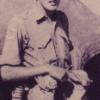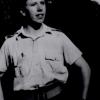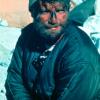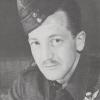In December 1943 Lieutenant Glove returned with the battalion to England, where they were billeted in the area around Oakham in Rutland. Battalion Headquarters was in Somerby House.
On one cold night a fire broke out in the house in which Battalion Headquarters was billeted. The Q.M. immediately raised a fire piquet, although when he tried to rouse men sleeping in the stables with a shout of “Fire in the Adjutant’s Office” he got one sleepy reply – “Lucky so-and-so, we’ve got no fire”. Pat Glover, Sammy Carr and the fire piquet could not quell the main fire, but they did with difficulty manage to save some items of furniture stored in the wings. In the morning their “priceless antiques” proved to be maid’s furniture of little value’. [1]
By 1944 Glover was 35 years old, short and stocky in build, and had achieved fame in the Airborne world by adopting a chicken as a pet several months prior to Arnhem and training it as a parachutist. The episode began in July 1944, at a time when the 1st Airborne were preparing to get back into the war but morale was hit by a procession of cancelled operations over the summer. Glover was as frustrated as any other man in the Division, and so to take his mind off events he would stroll about the Somerby countryside with a .22 calibre air rifle and he would fire at most anything that moved. On one of his excursions he came across a weathervane in the shape of a chicken on top of the village church, and from a range of 60 yards he hit it with two shots. Later that evening he recounted this feat to the men in the officers mess. Someone expressed doubt that an air rifle could hit a target from that range, and before long the discussion had developed to the point where Glover found himself defending the principle that any bird in possession of both wings and feathers could fly. Not in the least deterred by the well known fact that chickens could not fly, Glover proposed to settle the argument once and for all by taking a chicken with him on a practice jump that was to be held in two days time, and by letting go of the bird as he descended he would prove that it could fly. The next day Glover visited the local farm and, without the owners consent, spent an hour trying to catch a chicken. He departed clutching a reddish bird, and though he was not and never would be sure of its sex, he christened her Myrtle.
On the day of the jump Glover put Myrtle inside a zip-up canvas bag attached to his left shoulder, and once he had jumped and his parachute had deployed he opened the bag to let the chicken out. Myrtle put her head out, saw where she was, and promptly retreated back into the bag. When Glover was down to approximately 50 feet, he reached for Myrtle and released her. Much squawking and a frenzied and utterly artless flapping of wings followed, however Myrtle was definitely flying and landed safely. When Glover landed he was so concerned about preventing Myrtle from running away that he completely forgot to collapse his chute, and so holding on to a chicken with one hand and trying desperately to attend to his parachute with the other, he was dragged across the ground and before he came to a halt he had dislocated a thumb. He kept Myrtle perched on an iron bar on the desk in his office, and if a superior office ever demanded an explanation he had a prepared excuse to pass his pet off as living rations, reasoning that he wouldn't be a very good quartermaster if he didn't plan ahead for food shortages. More jumps followed over the Summer of 1944, and having completed the regulation number of practice drops Myrtle was awarded a set of parachute wings, secured around her neck on an elastic band. Myrtle the Parachick became an accomplished flyer through this training, and by the time of Arnhem she could safely be released from 300 feet and would patiently wait on the ground for her master to collect her.
As the 4th Para Brigade prepared themselves for take-off with the Second Lift on Monday 18th, Glover became worried about the condition of his parachute and attempted to swap it for a new one, because on each of the previous times that an operation was cancelled he had returned to his office, dropped the chute on the floor, and kicked it across the room. His request was refused. Whilst in a mood of safety first, he decided that he would not risk an incident on the drop zone and would hold on to Myrtle all the way down. Once they had been airborne for a few minutes Glover asked his batman, Private Joe Scott, if he had brought enough feed for Myrtle. Scott explained that he hadn't been able to find any corn but had compensated this with a few handfuls of Cornflakes. A War Correspondent, most likely the Jack Smyth of Reuters [Smyth jumped in on the first day and was on the DZ when the second lift arrived], was in Glover's aircraft and asked him for a crash course of parachuting techniques. The man said he had completed a few practice jumps before but was in need of knowing some of the finer points. Glover was quite surprised but helped him put his parachute on and told him how to make his exit and what he should do when he landed.
The formation ran into flak short of Arnhem and a few bursts hit Glover's C-47, the noise of which he described as being similar to someone battering the aircraft with a sledgehammer. Glover was to be the first man to jump from the plane, and as the flak grew worse he recalled a few men behind him urging him jump, but naturally the officer preferred to wait for the drop zone to be beneath his feet first. Like everyone else in the 4th Para Brigade, Glover did not expect that the drop would be opposed, but as he was out the door and gliding down he could see that a battle raged beneath his feet and that shots were coming up at them, for a moment he wondered if they had been dropped in the wrong place. As he landed Glover deliberately rolled onto his right shoulder to avoid injury to Myrtle, and once he had found Joe Scott he trusted Myrtle to his care as they both headed toward the yellow [green] smoke that marked the rendezvous point. Mortars and shells were exploding everywhere and Ginkel Heath had been set ablaze; fires that some paratroopers fell into. Moving off the zone he ran into a very badly wounded 20 year old Lieutenant of the 156 Battalion, hit with incendiary rounds in his legs and chest. The man was in a great deal of pain and so Glover administered morphia and left to locate a medic. Other paratroopers came across this man, known only to be a brave and popular officer, but smoke was now coming from his wounds and he pleaded with these men to shoot him. Before they left him, one of the men placed the Lieutenant's cocked revolver in his hand. He was later found dead, though it is not entirely certain he committed suicide.
On the following day as the Polish lift was coming down, Glover tried to replenish dwindling water supplies and sent a Sergeant away in a Jeep loaded with dozens of water bottles to try and find some, however he never saw the man again. As the 10th Battalion withdrew across the railway line near Wolfheze at dusk, where they were holding the Brigade's left flank, Glover recalled that the whole area was covered by German machine-gunners and so in the poor light men minimized their chances of being seen by going up the railway embankment, lying down, and then rolling themselves over the top. Just as Glover was about to go over a determined German attack came in and the paratroopers dug themselves in at a pace. Once this skirmish had ended, Glover turned to Scott and suggested they have a brew-up. It was only then that he thought of Myrtle and asked Scott where she was. When the attack came and he began to dig in he remembered he had left her in her bag on the edge of the trench, and as Glover felt for the bag and brought it in he noticed that it had been riddled with bullets. Inside it Myrtle lay dead, on her back with her feet in the air. The two men left her in the bag and buried her beneath a hedge a few yards from where she fell. Glover wondered if he should remove her parachute wings, but as she had been Killed in Action he decided to leave them on. With the grave filled in Scott rose to his feet, dusted himself off, and delivered the following eulogy, "Well, she was game to the last, sir."
At approximately 3am on Wednesday 20th, Glover was at Battalion HQ with Lieutenant-Colonel Smyth and Major Ashworth of HQ Company. By this time the Germans were all around their positions and the Battalion had become fragmented and no longer functioned as an organized unit. Smyth said "Look, I think we've had it. I've lost my command and I don't know where we are. I think you'd better get in pairs and decide if you want to stick with me or go it on your own." As instructed by their commander, Glover and Ashworth went away to discuss this but were both determined to stick with the Colonel. As dawn came the remains of the 10th Battalion's companies were reunited with their HQ and so, dogged on two sides by German interference, they began to make their way south towards the Oosterbeek Perimeter. Nearing the edge of the British defence Smyth said to Glover "There are not many Germans between us and headquarters and those that are we're going to charge." What was left of the 10th Battalion fixed bayonets, surged forward, and successfully broke into the Perimeter. As Smyth reported to Major-General Urquhart that only 60 men remained of his Battalion, Glover sat down and propped himself up against a tree. To his left, also propped against a tree, were two dead Glider Pilots, but Glover was too tired to pay them more than a courteous glance. Also both of his feet were badly blistered in spite of having two pairs of socks on.
As he rested outside the Hartenstein, Glover heard the rumble of aircraft approaching and thought "Oh, my God, what next?", but it only turned out to be the RAF bringing in supplies. Once they had completed their run and dropped their cargo Lt-Colonel Packe of the RASC asked Glover and three other men to retrieve what supply canisters they could find that had been dropped locally, however as he was about to leave Major Ashworth came back and told Glover that Lt-Colonel Smyth wanted him to visit the Oosterbeek crossroads, at the centre of the eastern side of the Perimeter, and report back on what 1st Airborne positions were in the area. Having conducted a reconnaissance and returned to the Hartenstein he was told to go back with as many men as he could gather. He found half a dozen and set himself up in a house with Lieutenant Saunders of No 18 Platoon, but was later moved further forward and into a large building, a former restaurant, situated on the corner of a lane.
Along the lane was a German self-propelled gun that had been knocked out. Major Peter Warr of B Company was based in the building on the opposite side of the road behind Glover's position, and he shouted across to him to have a look at the tank to see if he could do anything with it, having previously been a cavalry officer. The machines interior was smothered with blood, the breech block was missing, and there was a strong smell of diesel. Glover knew immediately that the vehicles chief ailment was a hit to its fuel tank, but in spite of this he was able to start the engine and allowed it 10 minutes to warm up. Unfortunately in so doing he made himself a target for both sides, because the British saw a functioning German tank, and the Germans knew that they had abandoned it and so presumed that it was about to be used against them. Explosions went off around the tank and rocked it so much that it knocked Glover's false teeth out. It was a terrible time for him, and his brave efforts were followed by much disappointment that he would not be able to use the tank to attack German positions as it only managed 10 yards of movement before the engine gave way and packed up.
When dawn came on Thursday 21st, Glover took hold of a rifle and shot at German snipers that he could see in the vicinity, and believed he had hit three or four of them. As is the danger with sniping, his position was eventually spotted and a shell was directed at his building which resulted in Glover falling from the first floor and into the room below. He was not injured as a result of this, though one private was with a shell splinter through the bridge of his nose, which Glover obligingly pulled out with a pair of pliers. Immediately after Glover went to the side door in the house in time to see a German moving across the road who he promptly shot. A German tank then appeared and began to fire into the house occupied by Major Warr and Lt-Colonel Smyth. Glover overheard a debate between the two men as to whether they should stay or abandon, and in the end they retreated to Lieutenant Saunders's building under cover of smoke and covering fire provided from Glover's position.
Later in the day German soldiers occupied the position that Warr and Smyth had abandoned, thus cutting Glover off, and proceeded to put a great deal of machine-gun fire down on his building, but the parachutists put an end to this by charging across the road and driving them out. With the situation stabilized for the moment, Glover turned his attention back to sniping and he was about to shoot a German moving across the green to the north of his position when a bullet hit his right hand and severed two veins. This caused a great deal of blood and in spite of a tourniquet he could not stop the flow, so he left Sergeant Hughes in charge and made his way back through the rain to the Schoonoord dressing station a few hundred yards away. Moving from house to house he was shot at several times by snipers and received a further wound to his right calf when he was caught in a mortar explosion, however he otherwise reached the station intact.
He was helped into the back room which had become the operating theatre, the whole room literally covered in blood, and he was lifted onto the makeshift operating table, made out of a stretcher laid across two tables. The doctor informed him that morphia was in short supply but that they would give him a shot if the pain proved too great, but Glover declined the offer and waved them on to continue. As the doctor was examining his leg he said to Glover with a grim smile "Don't look now, but we've got company". Glover looked behind him and saw a German soldier holding a Schmeisser which was pointed straight at him. The doctor said "Keep quiet, and he'll go away.", but although the German did turn his back to the operating room, he did not leave but instead stood in the doorway. Glover lost consciousness shortly after.
On Friday 22nd, now a Prisoner of War, Glover and several other wounded men were loaded onto a horse and cart and taken to the St Elizabeth Hospital, where he was put in a bed on the top floor. He had removed his badges of rank in the belief that he would have a greater chance of escaping if he became a private. On Sunday 24th he was transported in a similar fashion to the prison hospital established at Apeldoorn, and on the way there was an air raid which prompted the German driver and guard to take cover in a ditch while the wounds of the Airborne men dictated that they had to remain where they were. A Dutch priest visited the men at Apeldoorn each Sunday and succeeded in giving vague directions to those who wished to escape and contact the Resistance by slipping a few extra words into the Lord's Prayer. Glover overheard the following: "Our Father, who art in heaven Captain Peter, Hallowed be thy name Underground, Give us this day Otterloo". Though the instructions were hardly precise Glover knew he should head for Otterloo and make contact with a Captain Peter of the Resistance.
On the 15th October, Glover's 34's birthday, he escaped. As he was leaving a fellow officer expressed concern over the fate of the rest of the men in the hospital if he ran, due to the agreement had been reached between the British and the Germans that Apeldoorn would be treated as a hospital and not as a POW camp on condition that no one attempted to escape. Glover stated that he didn't give a damn what happened because it was his duty to try to escape, however the officer persisted with his protest until he forced Glover to take another man with him in case there were reprisals. As Glover had planned it, the two men fell into line with the cooks who were marched from the cookhouse at 6pm each night to their cells nearby, but separated from the procession to hide in a shelter close to the cookhouse. They waited here until it was dark, and at 7:45pm Glover ran across to the green and buried himself beneath an enormous Red Cross flag on the ground. The other man was told to follow him 15 minutes later, however he did not turn up, nor did he do so for the further 15 minutes that Glover waited, and so as something had clearly gone wrong he pressed on without him. He made it to the edge of the compound where he had to cross a road to reach the wire, however the sentries on the road were too close together for him to have any chance of crossing without being spotted. Glover waited for a while and wondered what he should do, when at last he heard the sound of an aircraft passing low overheard, and reasoning that the normal reaction of anyone on the ground would be to look up at it as it went above them, he bolted across the road as it came over and he was not seen. The barbed-wire fence had cans tied to them to serve as an alarm if anyone tempted to cross them, but as well as a pair of wire cutters Glover also had the foresight to bring some string with him to tie the wires together to prevent the cans rattling as he cut through them. Once on the other side he swam across the dike and, guided by an escape map and compass, proceeded to head in a southwesterly direction towards Otterloo.
Moving cautiously, it took him an entire day to find his way around Deelen Aerodrome. He spent most of the time in the woods, and when it rained he was in the habit of tying himself to the trunks of trees with a towel to ensure that when he slept it wasn't on the wet ground. It was on one such occasion that he was scared half to death by the sudden grunting of some pigs who were searching for food. Three or four days after his escape he was tired, cold, and in dire need of nourishment when he happened upon a farmhouse and decided to risk asking the owner to spare some food. The man who answered the door initially told Glover to go away, but he had a change of heart and told him to go and hide in the garden, where he was later hidden in a hole in the ground. Three days later a member of the Dutch Resistance came to the farm and briefly interviewed Glover before taking his leave, and on the following day another Resistance man came, however this one was armed with a revolver. The man asked who Glover was and demanded the passwords that the Division had used for the first two days of the Operation. Glover thought for a moment and gave him the answers, after which the man gave him a cigarette and a letter from Brigadier Hackett, which offered congratulations on his escape and ordered him to do all that he was told by the Dutch. It became apparent that the Dutchman standing before Glover was no less a man than the mysterious Captain Peter himself.
Not long after, Glover was given a pair of overalls to put on and was informed that he was to be evacuated to the Allied lines immediately - he was just in time to join Pegasus I; the evacuation of 139 mostly British Airborne troops across the Rhine. As the two men left the farmhouse a German soldier on a motorbike appeared from up the road, and for a brief moment it crossed Glover's mind that Captain Peter may have given him away, however it quickly became clear that the man was lost and stopped only to ask for directions. Glover sat on the back of a bicycle which Captain Peter pedaled, and some time later along the road they met a column of some 2-300 German soldiers marching towards them. The Dutchman wanted to know if Glover had any weapons handy, but he only had the wire cutters, and so they decided to run the gauntlet and hope that they were not challenged. Glover did not mention it, but he noticed that the trouser legs on his overalls had been pushed up and were presently revealing the British Army trousers he wore underneath, however not a single German noticed and they passed unhindered. After a while longer they arrived in the woods where the 138 other men of Pegasus I were assembling for the journey to the riverbank. Taken down to the Rhine, Glover was in command of a small group of American servicemen, and for their successful evacuation he was awarded the US Bronze Star. He caught the last boat across the river, but they had to turn back because they were so eager to get away that they had left behind the engineer who had guided the boat in.
From the southern bank of the Rhine, Glover was taken to a hospital in Nijmegen, and at the end of the month all the men from Pegasus I were flown back to England.
Main source of information Pegasusarchive. [1] THE TENTH. By Major. R. Brammall, MBE, TD. Page 34.
By Bob Hilton
Read More




Latest Comments
There are currently no comments for this content.
Add Comment
In order to add comments you must be registered with ParaData.
If you are currently a ParaData member please login.
If you are not currently a ParaData member but wish to get involved please register.